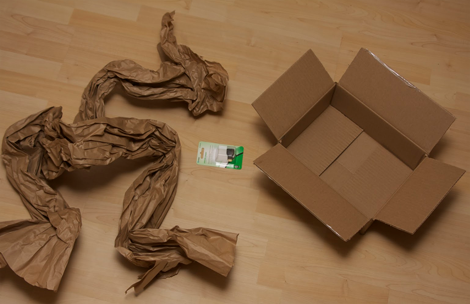This week’s guest post comes from Claudia Cox, a Classics student at Edinburgh University entering her final year of study. Claudia is passionate about sustainability and protecting the environment, and also loves getting involved in social and environmental projects to encourage positive change where possible.
…………………………………………………………………………………………………………
Why its time online retailers get serious about sustainable packaging
A recent survey by UPS shows that people are now doing 51% of their shopping online (excluding groceries), which is a vast amount in comparison to just a few years ago.
This is great news for the environmental side of things, as customers who tend to shop online rather than in stores have already reduced their carbon footprint by driving less, and research carried out by Carnegie Melon University has found that it is more eco friendly for businesses to be online since they have an overall energy consumption that is 30% lower than traditional shops.
But there’s also another side of the same coin: with increased demand for delivered items also comes the need for more and more packaging. So it becomes clear that it’s time online retailers up their game and think seriously about the parcels they’re sending out each day and the ways in which they can help reduce their negative impact on the environment.
Who hasn’t, at some point, been shocked by the awfully excessive amount of wrapping they’ve ended up with when ordering a very small item? It is sad to learn that the Environmental Protection Agency estimated that in 2012 containers and packaging accounted for 30% (75.2m tons) of total solid waste generated in the US. Using eco-friendly packaging is therefore one of the most important steps companies can take to minimise their environmental impact.
However, conceded that having fully sustainable packaging throughout the supply chain is still a big challenge, it feels like all ecommerce retailers, and particularly the major ones, should be doing more to improve their packaging practices. Technology and innovation has helped to create sustainable alternatives, but big companies should also pay close attention to what startups are doing.

Ecovative, for example, uses agricultural waste to grow packaging in different shapes and the Finnish startup RePack gives customers of online retailers adopting the solution the option of paying a small deposit for reusable packaging at checkout. This deposit then gets reimbursed once the bag or box finds its way back to the company, via any post office in Europe. Others, like ethical clothing company Verry Kerry, have found some creative ways to minimise their environmental impact. Firstly they do not include a return form in every parcel, which on a large scale could amount to a huge saving in paper and ink. Enclosing return forms in every order seems to be a common practice among fashion retailers (ASOS & co) but, as Amazon & eBay demonstrate (with their online return policy), it’s clear that alternatives are available. Verry Kerry also send their (sustainably made) garments in recycled paper mailing bags, which are a great substitute of the commonly used plastic alternatives .

This is another way to check your packaging is sustainable, by ensuring that your products are enclosed in materials which are recyclable, as far as possible. For online retailers, this means not using flimsy plastic packaging to wrap items which is wasteful and unnecessary, but rather placing them inside packaging such as a reusable bag or a large recycled paper envelope. This keeps costs and environmental impact down to a minimum. Reducing the overall amount of packaging is also important, for example not using two separate bags for a product where one would suffice, and getting rid of excessive amounts of paper/plastic enclosed within the parcel.
The leading online fashion company ASOS have a list of packaging initiatives in line with these ideas, among which include using lighter packaging to help reduce CO2 emissions from deliveries and recycling packaging from customer returns. However although all their boxes are fully recyclable still only 25% of their bags are, and sadly this is the sort of packaging which is most frequently used by ASOS. It is clear from this that they are only part of the way there, and there is definitely so much more that they, as well as other large retail companies, can be doing to improve upon this.
To summarise, it is crucial that online retailers get their act together and start thinking seriously about how they can reduce the negative effects which unsustainable packaging has on the environment. It is the hope that in the future all retailers will have to adhere to strict guidelines about the way in which they conduct their packaging process, so why not take some initiative and start now, one step ahead of everyone else!

